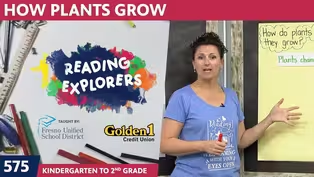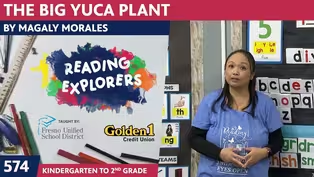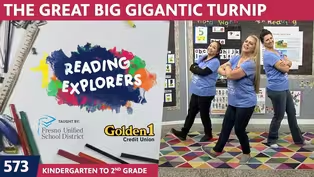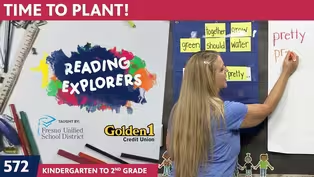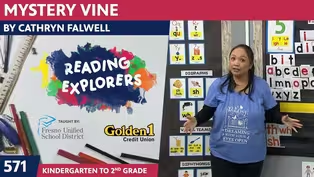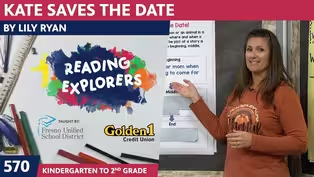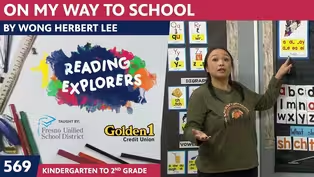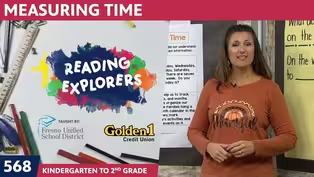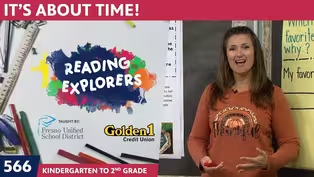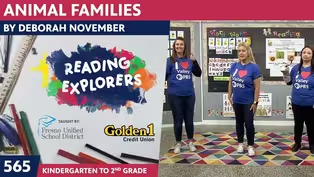
3-333: The Importance of Revision in the Writing Process
Season 3 Episode 178 | 14m 22sVideo has Closed Captions
Join Mrs. Nix at Camp Discovery!
Third Grade teacher, Mrs. Nix, welcomes students back to Camp Discovery, a fun learning space packed with reading adventures & fun games!
Problems playing video? | Closed Captioning Feedback
Problems playing video? | Closed Captioning Feedback
Reading Explorers is a local public television program presented by Valley PBS

3-333: The Importance of Revision in the Writing Process
Season 3 Episode 178 | 14m 22sVideo has Closed Captions
Third Grade teacher, Mrs. Nix, welcomes students back to Camp Discovery, a fun learning space packed with reading adventures & fun games!
Problems playing video? | Closed Captioning Feedback
How to Watch Reading Explorers
Reading Explorers is available to stream on pbs.org and the free PBS App, available on iPhone, Apple TV, Android TV, Android smartphones, Amazon Fire TV, Amazon Fire Tablet, Roku, Samsung Smart TV, and Vizio.
Providing Support for PBS.org
Learn Moreabout PBS online sponsorshipMore from This Collection
Valley PBS and Fresno Unified School District have partnered with Golden 1 Credit Union to create Reading Explorers Lessons for grades Pre-Kindergarten through Third grade. The daily lessons will be taught by Fresno Unified School District teachers and are created to help students practice their reading skills and reinforce lessons during distance learning.
Video has Closed Captions
Learn about the life cycle of a plant on Reading Explorers. (26m 39s)
K-2-574: The Big Yuca Plant by Magaly Morales
Video has Closed Captions
Join the Reading Explorers as we adventure into a new book The Big Yuca Plant. (26m 30s)
K-2-573: The Great Big Gigantic Turnip
Video has Closed Captions
What will happen at The Great Big Gigantic Turnip? (26m 30s)
K-2-571: Mystery Vine by Cathryn Falwell
Video has Closed Captions
The Bell has rung and the Valley PBS Classroom is open once more. (26m 32s)
K-2-570: Kate Saves The Date by Lily Ryan
Video has Closed Captions
Mrs. Nix, Mrs. Hammack and Mrs. Vang are glad to have you join her for a new day. (26m 32s)
K-2-569: On My Way To School by Wong Herbert Lee
Video has Closed Captions
Mrs. Vang is ready for a new day of phonemic awareness and reading comprehension. (26m 40s)
Video has Closed Captions
We review phonics, frequency words and more on Reading Explorers. (26m 45s)
K-2-567: Nate The Snake Is Late
Video has Closed Captions
What happens when Nate the Snake is late to school? (26m 49s)
Video has Closed Captions
It's time for school! How do you know what time it is? (26m 31s)
K-2-565: Animal Families by Deborah November
Video has Closed Captions
Welcome to the Reading Explorers lessons in the Valley PBS Classroom. (26m 14s)
K-2-564: From Caterpillar To Butterfly
Video has Closed Captions
The transformation from Caterpillar to Butterfly is a special one. (26m 52s)
Providing Support for PBS.org
Learn Moreabout PBS online sponsorship(guitar music) ♪ Good morning to a brand new day ♪ ♪ Time to learn and games to play ♪ ♪ learning things is so much fun ♪ ♪ Learning is good for everyone.
♪ (guitar music) (bright upbeat music) - Good morning, third graders.
My name is Mrs. Nixon.
I am so excited to be here with you today as we become amazing thinkers, readers and writers together.
Boys and girls I was just checking my email, and you know what?
I have some email this morning.
This one comes from, and I'm hoping I pronounced your name right.
So if I say it incorrectly, I just asked for a little grace.
But I believe her name is Eliana.
So Eliana, she is a student here in Fresno Unified, and she says, "hi, Mrs. Nix," "I enjoy watching the third grade PBS educational videos" "in the morning before school starts."
"I am learning a lot."
"I enjoy reading and some of the words" "that you teach I am finding in my books."
"I'd like to receive the activity book" "that you've talked about."
She remembered to include her address, so I'm gonna make sure that she gets one, and then down here she has a recommendation.
She says, "a book that I recommend is Wings of Fire."
"There are 15 books in the series," "but I am only on the third one."
"My dad has also read a lot of books to me."
"We read lots of Marguerite Henry books about horses," "and are now reading Tom Sawyer."
"We also like the Nancy Drew books," "because they are mystery books."
I love those too.
So Eliana, I definitely am gonna get one of these activity books in the mail for you so that you can have it and it's free.
If you want a book just like Eliana does, all you need to do is see that address that popped up at the bottom of the screen.
Make sure you send me a note, or you could be like Eliana and send me an email, and I'll get one of these books in the mail for you, and they're free.
Who doesn't like free?
Boys and girls, I have a couple of things that I do wanna share with you and that is in regards to books.
If you're looking for some of the books that Eliana has suggested to read, a couple of places you can check them out, your local county library or go online and check them out through Sora.
Here in Fresno Unified, we love to count down to our top five schools that are checking out books on Sora.
So today, we're gonna look at the third school this week and we're gonna see it is Ewing Elementary.
So congratulations Ewing for being in our top five, but you're in third place for schools that have checked out the most books.
Third grade, let's get started with this morning.
We're gonna start by warming up those brains, we're gonna look at some high frequency words.
See this big giant chart right here, you've been doing this.
This is the last five weeks, there are 50 high frequency words here.
So this week, we're doing kind of a review week, we're gonna talk about some poetry.
Today, we're looking at that writing process with poetry and we're focusing on revising.
And then at the end, we're gonna get into some grammar.
We'll talk about some helping verbs.
You ready?
Let's do this.
Let's go through and practice.
Now, I'm just gonna do 10 of them today, because these are review, you know these, let's get going.
Here we go play, please, pull, pretty, place, pick, part, people, own and over.
Nicely done third grade.
We are talking about poems today.
So let's look real quick just a reminder, we've talked about it the last couple of days, and we're gonna talk about it the couple of days to come.
But it's good to remember what are those features in a poem?
Well, they express feelings or ideas.
So are you gonna tell a sad poem, a happy poem, a funny poem?
It's often organized in lines and stanzas.
So line is just where it goes across, whereas a stanza is a group of lines together.
It may use rhyme and rhythm, figurative language is also included.
We've been practicing metaphors and similes, so we could put some of that in our poems.
And then finally descriptive words using those sensory details, thinking about what does it look like?
What does it smell like?
What does it taste like, sound like?
What does it feel like?
So think about those sensory details.
Now, today, we're specifically gonna be looking at, let me turn this around.
Today we're gonna specifically look at how to revise.
So yesterday we started practicing and getting that first draft.
And remember, we talked about, we're not getting it perfect, we're not worried about the spelling, we're not worried about if the words are rhyming necessarily yet, cause we will, as we go through and we revise.
Now it's time to step back and start planning some of that.
So looking here, when you go through and you revise your draft, here are some things to think about.
Are there any details or information that you could add that could make it more clear?
Here's another one, remove that those distracting or unnecessary words or ideas.
Do you have any words that are bland?
Or maybe they're overused?
Can you come up with some more precise or stronger words?
Or maybe even this, maybe you need to rearrange some sentences to make sure that the readers understand the message.
So those are some things that you might do to revise.
A reminder to use that figurative language, and so just a reminder.
Remember that similes use, like or as, when they're comparing two things.
My love is like a beautiful flower, that would be a simile, whereas metaphors, they don't use that like or as in their sentences.
But see if you can add some figurative language into your poem.
After you've started to kind of review it a little, you're gonna want to talk with a peer or a family member, and have them look at over a couple of questions that I always think are great to ask when someone says, can you read this for me?
I always wanna ask the writer, what do you like about your writing?
Cause I wanna know, what is it about it that you like?
And what would you like to change?
Is there a spot that you look at, and I can't think of a word that rhymes, or I can't think of a sensory word.
And so you can be real specific when you're asking for help.
And then, as the person who's looking over your writing, we would also wanna ask you, what else would you like, what else would I like to know?
So I might ask you, what else, if there's something that I have a clarifying question in regards to.
So to help me be able to do this, and go through and revise, it's always nice to have a checklist.
So this checklist is here, and it kind of goes through again, those features of our poem.
So does the poem express feelings or ideas?
Is it organized in lines and stanzas?
Does it have lines that rhyme?
Does it have a rhythm, figurative language, is it used?
Does the poem use strong descriptive words?
So as I'm going through a poem, it's helpful to know, what is it that I'm looking for?
Let's go back, and let's look at that draft that we wrote yesterday, and let's see if we can find some of those things that we were not so sure about yesterday.
So Let's read it together.
The Carnival came when I was ten, I went two times, then went some more.
Well, I'm gonna stop for just a second right there.
Does that rhyme?
Does ten and more rhyme?
Maybe I could put something different.
And you know what I thought about it?
What if I changed it and I said instead of some more, what if I said again?
Ten, again, do they sound the same?
Let's try it.
The Carnival came when I was ten, I went two times then went again.
Oh, that sounds good.
A ride were spinning called wheel and top.
Really long arms climb and drop.
Ooh, you know what has really long arms that I think we could put that would sound more descriptive?
What if I said, arms like an octopus?
Does that sound more descriptive?
A ride were spinning called Wieland top.
Arms like an octopus climb and drop.
I like that.
I scrambled on to take a ride.
The music played it's tunes inside.
The Carnival came when I was ten, I went two times then, oh, we got to fix that again, then went again, good.
Hotdogs, pretzels, apples too, so much fun, too much to do.
I wandered home because I was tired, as the lights behind me shined and shined.
Hmm, what am I gonna do there?
Tired and shined, they end with the same letters, but they don't rhyme.
What can I put instead?
What if I said, I wandered home, tired and dazed, tired and dazed, as the lights behind me sparkled and blazed.
Those rhyme, that makes so much more sense.
So, as I went through and looked at and was revising, I was able to change some of my words.
I know you can do the same thing with your draft that you've been working on.
I'd love for you to do that tonight.
Go through, can you find some more descriptive words, things that fit, rhyme?
You can do it.
Let's finish off today just with a little bit of grammar practice.
These are main and helping verbs.
Now remember, a verb is an action word, and the main verb tells what the subject is or what it does.
But a helping verb helps the main verb show action, like has baked.
So some helping verbs are have, has, had.
So here's some examples right here.
Mom and I have baked cupcakes.
She has baked in apple pie.
Dad had baked bread before leaving for work.
So when we find that verb, we're gonna see that helping verb right before it.
So it says read each sentence, underline the main verb and circle the helping verb.
So we're gonna underline that main verb.
So let's see what Jenna is doing.
Jenna has read a book about recycling.
What did Jenna do?
She read.
Where's our helping verb?
You got it, it's right in front of it, has read.
Nate, and Jenna have talked to our class about helping.
Well, what did Nate and Jenna do?
Well, they talked.
That's our main verb, and what helped it along?
Have talked, great.
Now, let's do just down here, let's just finish this one off, and we'll save this one for another day.
Mr. Hart's class had started recycling last year.
What did Mr. Hart's class do?
They started recycling.
What's our helping verb?
Had, had started, excellent.
So I think I have just one, oh, I think I have just a little bit of time, let's talk about the verb be.
Next week my family, we can be using will or are visit Mount Rushmore.
Next week, my family will visit cause not are visit, it doesn't make sense.
We, am or are, planning to leave Tuesday.
We, we wouldn't say am, we would say we are, awesome.
I'm gonna leave it right there because I know I'm running out of time.
Third grade I had a great time hanging out with you today.
I hope you have a fantastic afternoon.
I can't wait to see you back here at PBS.
Have a good one, bye bye.
(guitar music) ♪ Good morning to a brand new day ♪ ♪ Time to learn and games to play ♪ ♪ learning things is so much fun ♪ ♪ Learning is good for everyone.
♪ (guitar music)
Support for PBS provided by:
Reading Explorers is a local public television program presented by Valley PBS
